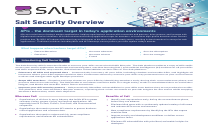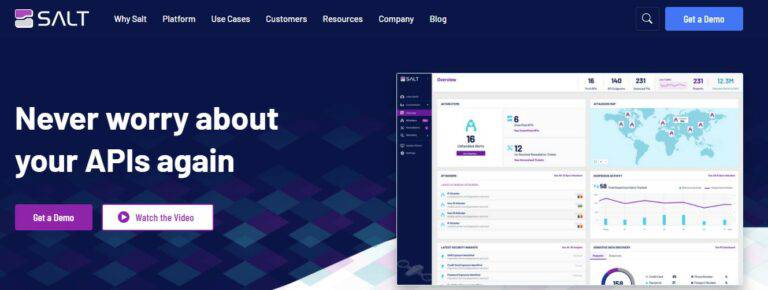
Salt Security
Founded Year
2016Stage
Unattributed VC | AliveTotal Raised
$280.74MMosaic Score The Mosaic Score is an algorithm that measures the overall financial health and market potential of private companies.
-44 points in the past 30 days
About Salt Security
Salt Security focuses on API security and provides a platform to protect APIs throughout their lifecycle. The company's services include API discovery, posture management, threat protection, incident response, and remediation insights, targeting sectors that rely on application programming interfaces for digital operations and data exchange. Salt Security was formerly known as Secful. It was founded in 2016 and is based in Palo Alto, California.
Loading...
Salt Security's Product Videos


ESPs containing Salt Security
The ESP matrix leverages data and analyst insight to identify and rank leading companies in a given technology landscape.
The WAAP market is focused on protecting the APIs that form the core of modern applications. This includes preventing next-generation API attacks and providing protection across build, deploy, and runtime phases. Solutions in this market offer unique API design analysis in pre-production, continuous monitoring for compliance, and the ability to detect and block bad actors before they reach their o…
Salt Security named as Leader among 15 other companies, including Akamai, Palo Alto Networks, and Check Point.
Salt Security's Products & Differentiators
Salt Security API Protection Platform
The Salt Security API Protection Platform, enables organizations to protect their APIs across build, deploy, and runtime phases. Through its unique API Context Engine (ACE) architecture, the Salt platform is able to discover all APIs and the sensitive data that they expose, identify API vulnerabilities in pre-production testing, stop API attackers, prevent data exfiltration, account takeovers, and service disruption, provide remediation insights, and simplify compliance. The platform taps its big data engine to collect and analyze the activity of millions of users in parallel, across millions of APIs. This architecture allows the Salt platform to piece together the subtle probing of an attacker during reconnaissance, assess the risk of their activity, and pinpoint and stop them early in their process.
Loading...
Research containing Salt Security
Get data-driven expert analysis from the CB Insights Intelligence Unit.
CB Insights Intelligence Analysts have mentioned Salt Security in 1 CB Insights research brief, most recently on Feb 14, 2022.
Expert Collections containing Salt Security
Expert Collections are analyst-curated lists that highlight the companies you need to know in the most important technology spaces.
Salt Security is included in 2 Expert Collections, including Unicorns- Billion Dollar Startups.
Unicorns- Billion Dollar Startups
1,258 items
Cybersecurity
10,080 items
These companies protect organizations from digital threats.
Salt Security Patents
Salt Security has filed 1 patent.

Application Date | Grant Date | Title | Related Topics | Status |
|---|---|---|---|---|
4/13/2016 | 12/26/2017 | Application programming interfaces, Data modeling, Database management systems, Data management, Cyberwarfare | Grant |
Application Date | 4/13/2016 |
|---|---|
Grant Date | 12/26/2017 |
Title | |
Related Topics | Application programming interfaces, Data modeling, Database management systems, Data management, Cyberwarfare |
Status | Grant |
Latest Salt Security News
Jan 23, 2025
Security Boulevard Community Chats Webinars Library Treasury Department Breach: A Crucial Reminder for API Security in the Public Sector The recent cyber breach at the U.S. Treasury Department, linked to state-sponsored Chinese hackers, has set off alarm bells in the public sector. As the investigation continues, this incident reveals a pressing issue that all government agencies must confront: securing their APIs (Application Programming Interfaces). APIs are essential connections within our digital infrastructure, facilitating communication and data sharing between systems. However, with their increasing usage comes a greater risk of them being exploited as attack points. This breach, believed to originate from a weakness in a third-party software vendor, specifically BeyondTrust, underscores the interconnectedness of today’s IT networks and highlights the necessity for a robust, layered security strategy. The Mechanics of a Breach: API Vulnerabilities Under Attack While comprehensive details are still emerging, attackers capitalized on a vulnerability within BeyondTrust’s software to infiltrate the Treasury’s systems. This tactic of supply chain attacks is becoming more prevalent, as malicious actors often target the weakest links to achieve their goals. In this case, the attackers exploited BeyondTrust’s privileged remote access product, which Treasury employees used. Once inside, attackers might have used compromised API keys or taken advantage of other API flaws to access sensitive information. Salt Security: Stopping Future Treasury Department Breaches This event highlights the urgent need for strong API security solutions that instantly recognize and thwart attacks. At Salt Security, our API Protection Platform is specifically built to tackle these issues directly. Here’s how Salt could have helped to prevent or lessen the impact of this breach: Comprehensive API Visibility: Salt offers complete visibility into all API traffic, including shadow APIs and those controlled by third-party vendors like BeyondTrust. This enables organizations to pinpoint and rectify potential vulnerabilities before exploiting them. This capability is vital in complex settings like the Treasury Department, where many interconnected systems depend on APIs for communication. Stolen API Key Detection: Our platform specializes in detecting compromised API keys. Here’s how: SIEM Alerts and Attacker Dashboard: Salt generates alerts in your SIEM and our Attacker Dashboard, clearly marking the compromised API key as the source of malicious actions. This facilitates immediate correlation of related events, regardless of the attacker’s attempts to disguise their origin. Robust Correlation: The compromised API key is the primary identifier, linking all the attacker’s actions, even if they use proxies or VPNs to hide their IP address. This provides a clear and thorough understanding of the attack’s progression. Geolocation Data: If the attacker makes mistakes, Salt can utilize geolocation data to track unusual foreign connections tied to the compromised key, which is especially significant in a case involving a U.S. federal agency. Real-time Threat Identification: Salt Security detects suspicious and malicious activities in real-time, such as: Parameter Tampering: Identifying unauthorized alterations to API parameters, signaling attempts to manipulate data or exploit vulnerabilities. Abnormal Responses: Recognizing unusual or unexpected responses from the API, potentially indicating an attacker probing for weaknesses. Injection Exploits: Detecting and blocking attempts to inject malicious code, such as SQL injection or cross-site scripting, without depending on known CVEs (Common Vulnerabilities and Exposures). This proactive strategy ensures protection against zero-day exploits. OWASP Attacks: Recognizing and addressing a broad range of attacks documented in the OWASP (Open Web Application Security Project) API Security Top 10 , including broken authentication, sensitive data exposure, and security misconfigurations. Advanced Threat Detection: In addition to fundamental security protocols, Salt employs AI-driven behavioral analytics to identify complex attacks that may evade traditional security measures. This encompasses spotting anomalies in API usage patterns, recognizing malicious behavior, and proactively blocking attacks before they inflict harm. Key Lessons: Fortifying API Security Across the Public Sector The breach at the Treasury Department is a critical lesson for the public sector as a whole. Here are essential takeaways for government agencies: Emphasize API Security: APIs are vital to government operations and are prime targets for cybercriminals. Agencies must focus on API security and enforce strong protective measures. Implement a Zero Trust Framework: Treat every API call as potentially harmful. Enforce rigorous authentication and authorization methods, and continuously surveil API traffic for signs of suspicious activity. Bolster Supply Chain Security: Diligently vet third-party vendors like BeyondTrust and confirm they maintain rigorous security standards. Don’t just rely on vendor assurances; contractually obligate them to use approved API security tools for their software. Regular evaluations and monitoring of the security status of your entire supply chain are crucial. Salt Security: Your Partner in API Protection The increasing reliance on APIs across all industries underscores the urgent need for robust API security. Whether you’re in government, finance, healthcare, e-commerce, or any other sector that leverages APIs to connect applications and data, Salt Security can help you safeguard your critical assets. Our API Protection Platform provides the comprehensive visibility, posture governance, advanced threat detection, and real-time response capabilities needed to stay ahead of the curve in today’s ever-evolving threat landscape. If you want to learn more about Salt and how we can help you on your API Security journey through discovery, posture governance, and run-time threat protection, please contact us , schedule a demo , or check out our website . *** This is a Security Bloggers Network syndicated blog from Salt Security blog authored by Eric Schwake . Read the original post at: https://salt.security/blog/treasury-department-breach-a-crucial-reminder-for-api-security-in-the-public-sector
Salt Security Frequently Asked Questions (FAQ)
When was Salt Security founded?
Salt Security was founded in 2016.
Where is Salt Security's headquarters?
Salt Security's headquarters is located at 3921 Fabian Way, Palo Alto.
What is Salt Security's latest funding round?
Salt Security's latest funding round is Unattributed VC.
How much did Salt Security raise?
Salt Security raised a total of $280.74M.
Who are the investors of Salt Security?
Investors of Salt Security include CrowdStrike Falcon Fund, Y Combinator, Sequoia Capital, Tenaya Capital, S Capital VC and 13 more.
Who are Salt Security's competitors?
Competitors of Salt Security include FireTail, Noname Security, Traceable AI, Wib, Wallarm and 7 more.
What products does Salt Security offer?
Salt Security's products include Salt Security API Protection Platform.
Who are Salt Security's customers?
Customers of Salt Security include Finastra and DeinDeal.
Loading...
Compare Salt Security to Competitors

Cequence specializes in API security and bot management within the cybersecurity industry. The company offers a Unified API Protection solution that encompasses discovery, compliance, and protection against attacks, business logic abuse, and fraud for applications and APIs. Cequence primarily serves sectors such as automotive, financial services, healthcare, online dating, public sector, retail, and telecom across different business sizes, from SMBs to enterprises. Cequence was formerly known as stealth security. It was founded in 2014 and is based in Santa Clara, California.

Aiculus focuses on API security within the cybersecurity domain. The company uses artificial intelligence to monitor, detect, and respond to API security threats in real-time, aiming to protect customer data and organizational reputation. Aiculus serves sectors that need API security, such as e-commerce platforms, financial services, and technology companies. It was founded in 2018 and is based in Singapore.

Traceable AI specializes in API security solutions within the cybersecurity industry. The company offers a platform that provides API discovery, threat detection, attack protection, fraud and bot security, and API testing services. Traceable AI primarily serves sectors such as finance and banking, government and public sector, healthcare, high tech, and retail and eCommerce. It was founded in 2018 and is based in San Francisco, California.

Apoxy is a company focused on providing solutions for API monitoring and management within the tech industry. Their platform offers tools for observing and securing API calls, as well as facilitating the evolution of API services. The company primarily caters to developers and businesses looking to enhance their API infrastructure. It was founded in 2023 and is based in San Francisco, California.

Ever.Security specializes in cybersecurity and operates in the information security industry. The company offers services such as anti-fraud solutions and API security, utilizing big data analysis to address cybersecurity threats and incidents. Ever.Security primarily serves sectors such as finance, media, and e-commerce platforms. It was founded in 2017 and is based in Shenzhen, Guangdong.

ammune.ai operates as a cybersecurity company. The company provides services to help organizations protect their infrastructure, applications, customers, employees, and partners from application program interface (API) borne attacks using autonomous artificial intelligence (AI) based solutions. It was formerly known as L7 Defense. It was founded in 2015 and is based in Jersey City, New Jersey.
Loading...
